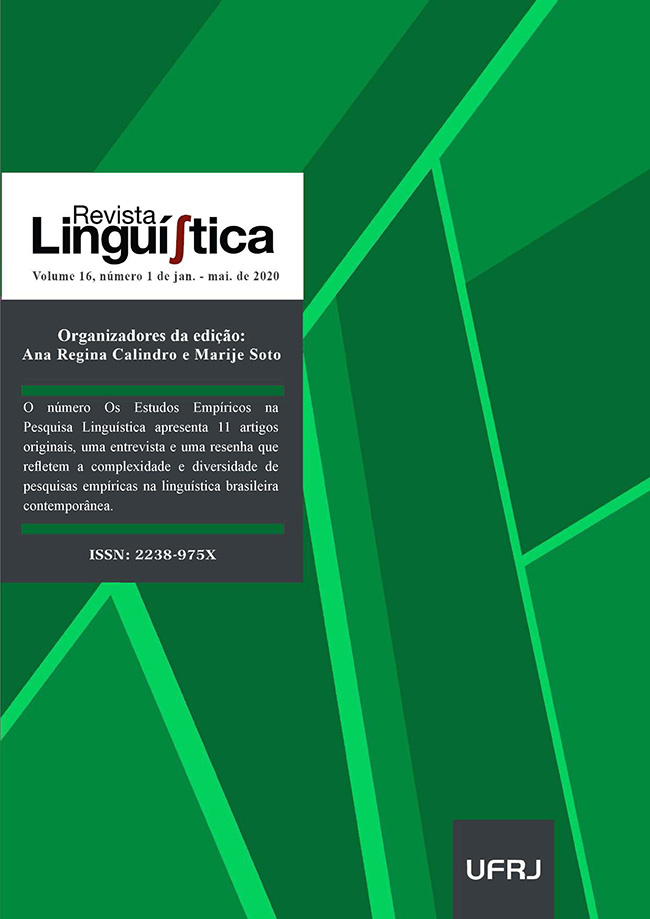The new neurocognitive science of language: innovative experimental design for studying syntactic and semantic processing in communicative settings, an interview with Katrien Segaerts
DOI:
https://doi.org/10.31513/linguistica.2020.v16n1a35356Palavras-chave:
InterviewResumo
Katrien Segaert is the head of the Neuroscience of Language lab at the School of Psychology at the University of Birmingham (UK), where she is also affiliated with the Centre for Human Brain Health. Her research deals with the major question of how syntax and semantic processing are instantiated in the brain within the context of communicative settings, and how the neurobiological circuitry for sentence processing changes throughout our lives. Her lab does experimental studies with a variety of techniques, ranging from EEG and fMRI to classical psycholinguistic methodologies. Her work has been really innovative in the ways she has managed to bring communicative context to experimental paradigms: participants engaged with avatars, or interacted with interlocutors while lying in the MRI scanner. Another series of her studies that have attracted some media attention are those involving aging adults: results have shown surprising correlations between language processing and fitness. She has agreed to talk to us about working with novel experimental methodologies in a highly interdisciplinary field.
----------------------------------------------------------------------------------
A NOVA CIÊNCIA NEUROCOGNITIVA DA LINGUAGEM: PARADIGMAS EXPERIMENTAIS INOVADORES PARA ESTUDAR O PROCESSAMENTO SINTÁTICO E SEMÂNTICO EM CONTEXTOS COMUNICATIVOS, UMA ENTREVISTA COM KATRIEN SEGAERTS
Katrien Segaert é a coordenadora do laboratório de Neurociências da Linguagem da Escola de Psicologia da Universidade de Birmingham (Reino Unido) e afiliada ao Centro de Saúde do Cérebro Humano. Sua pesquisa investiga como a sintaxe e o processamento semântico são instanciados no cérebro dentro de contextos comunicativos, e como o circuito neurobiológico para o processamento de sentenças muda ao longo da vida. O seu laboratório faz estudos experimentais com uma pluralidade de técnicas, variando de eletroencefalografia (EEG) e imagem de ressonância magnética funcional (fMRI) a metodologias psicolinguísticas clássicas. O trabalho da pesquisadora tem se mostrado realmente inovador nas maneiras pelas quais conseguiu associar o contexto comunicativo aos paradigmas experimentais: participantes envolvidos com avatares ou interagindo com interlocutores enquanto estavam no scannerde MRI. Seus estudos que envolvem adultos em envelhecimento têm atraído atenção da mídia, pois os resultados mostraram correlações surpreendentes entre o processamento da linguagem e a boa forma física. Katrien concordou em conversar conosco seu trabalho com novas metodologias experimentais em um campo altamente interdisciplinar.
---
Original em inglês.
Downloads
Downloads
Publicado
Edição
Seção
Licença
Autores que publicam na Revista Linguí∫tica concordam com os seguintes termos:
Os autores mantêm os direitos e cedem à revista o direito à primeira publicação, simultaneamente submetido a uma licença Creative Commons que permite o compartilhamento por terceiros com a devida menção ao autor e à primeira publicação pela Revista Linguí∫tica.
Os autores podem entrar em acordos contratuais adicionais e separados para a distribuição não exclusiva da versão publicada da obra (por exemplo, postá-la em um repositório institucional ou publicá-la em um livro), com o reconhecimento de sua publicação inicial na Revista Linguí∫tica.

A Revista Linguí∫tica é uma revista do Programa de Pós-Graduação em Linguística da UFRJ e se utiliza da Licença Creative Commons - Atribuição-NãoComercial 4.0 Internacional (CC-BY-NC)









